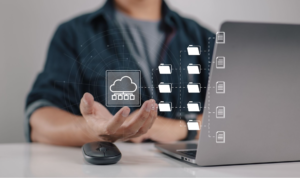What if your ERP system could think, learn, and make decisions like your best employee?
Modern AI-powered ERP automation makes this possible. While competitors struggle with manual processes, smart businesses use artificial intelligence to handle routine tasks, predict problems, and optimize operations automatically.
This shift changes everything. Companies using AI automation in their ERP systems report faster decision-making, lower costs, and better customer service.
The technology has moved beyond simple task automation to intelligent systems that adapt and improve over time.
According to Verizon research, AI adoption among small-to-midsize businesses nearly tripled from 2023 to 2024. This growth shows AI delivers real business value across different industries.
In this guide, you’ll discover:
- How AI transforms traditional ERP systems into intelligent platforms
- The top automation trends driving business success
- Practical steps to implement AI-powered ERP automation
- Why early adopters gain lasting competitive advantages
Contact Cumula 3 Group for NetSuite implementation services that integrate advanced AI automation features.
ALSO READ:
→ 5 NetSuite Features That Transform Manufacturing Operations
→ Why Food & Beverage Companies Choose NetSuite
→ 6 NetSuite Features Powering Modern E-commerce
→ 6 NetSuite Tools Driving Efficiency in Software Companies
→ 6 NetSuite Features Boosting Health & Beauty Brands
Why AI-Powered ERP Automation Matters Now
Traditional and AI-powered ERP systems work completely differently, changing how businesses operate from the ground up.
Old ERP systems store data and create reports when you ask. New AI-powered systems think ahead and take action automatically.
AI-powered ERP combines machine learning, natural language processing, robotic process automation, predictive analytics, and smart workflows. These technologies work together to create systems that learn and adapt over time.
Companies using AI automation see clear results:
- Speed – Tasks finish in minutes instead of hours
- Accuracy – Fewer errors in data entry and reports
- Cost Savings – Less manual work means lower operational costs
- Better Decisions – Real-time data helps managers choose wisely
- Happy Customers – Faster responses improve customer service
AI helps employees work smarter, not harder. It handles boring tasks so people can solve problems and build relationships. Cloud technology makes these AI features affordable for all business sizes without huge IT investments.
A NetSuite survey of over 500 executives found that 85% said increasing AI adoption would be at least somewhat important in the next year.
This data confirms that AI-powered ERP automation has moved from experimental to essential for competitive advantage.
These benefits explain why smart businesses are racing to adopt AI automation. But which specific trends are driving the biggest changes? Let’s explore the top automation developments reshaping how companies work.
ALSO READ:
→ 6 NetSuite Features Nonprofits Can’t Live Without
→ Top Benefits of NetSuite for Energy Companies
→ How NetSuite Transforms the Automotive Industry
→ 6 Must-Have NetSuite Features for Professional Services
→ 5 Key NetSuite Features for Fashion Brands
Top AI-Powered ERP Automation Trends Driving Success
Understanding current trends helps businesses choose the right AI automation features for their needs. These five developments are creating the biggest impact across industries.
Five major trends are reshaping how businesses use ERP systems. These developments create new opportunities for companies ready to embrace intelligent automation.
1. Smart Process Automation
AI systems now handle complete business processes from start to finish. Unlike simple automation that follows basic rules, smart systems consider multiple factors when making decisions.
How It Works:
- Systems analyze incoming data automatically
- AI applies business rules and considers exceptions
- Decisions get made without human intervention
- Complex cases escalate to human operators
- Results improve through continuous learning
Business Applications:
- Purchase order approvals based on supplier history and budget constraints
- Customer refund processing using order data and return policies
- Inventory reordering that considers seasonal trends and supplier lead times
- Employee expense approvals following company policies and spending patterns
Smart automation handles 80% of routine decisions while flagging unusual situations for human review.
2. Predictive Business Intelligence
Machine learning algorithms analyze historical data to forecast future business needs. This capability transforms reactive management into proactive strategy.
Key Prediction Areas:
A. Demand Forecasting a. Sales predictions based on market trends b. Seasonal demand patterns c. Customer behavior analysis d. Economic indicator impacts
B. Financial Planning a. Cash flow projections b. Budget variance predictions c. Revenue forecasting d. Cost optimization opportunities
C. Operational Efficiency a. Equipment maintenance needs b. Supply chain disruptions c. Quality control issues d. Workforce planning requirements
Real-World Example: A manufacturing company uses predictive analytics to anticipate equipment failures. The system schedules maintenance before breakdowns occur, reducing downtime by 40%.
3. Autonomous Decision Making
Advanced AI systems make complex business decisions independently. These “agentic AI” capabilities handle complete workflows without constant human oversight.
Decision-Making Capabilities:
- Vendor selection based on performance metrics and pricing
- Credit approvals using financial data and risk models
- Production scheduling considering demand and capacity
- Shipping route optimization for cost and speed
Safety Measures:
- Human approval required for decisions above set thresholds
- Complete audit trails for all automated decisions
- Real-time monitoring of decision quality
- Easy override capabilities for special circumstances
This technology works best for decisions with clear criteria and measurable outcomes.
4. Conversational ERP Interfaces
Natural language processing lets users interact with ERP systems like talking to a colleague. No more complex menus or specialized training required.
Communication Methods:
- Text-Based Chat: Ask questions and get instant answers
- Voice Commands: Update records hands-free in warehouses or vehicles
- Visual Interfaces: Point to charts and get detailed explanations
- Mobile Apps: Access full ERP functionality from smartphones
Sample Conversations:
- “Show me sales for last quarter by region”
- “Create a purchase order for 500 units from our top supplier”
- “What customers haven’t paid invoices over 30 days?”
- “Schedule maintenance for Machine #3 next Tuesday”
Multi-language support ensures global teams can use these features in their preferred languages.
5. Hyperautomation Integration
Hyperautomation combines multiple AI technologies to automate entire business processes. This approach eliminates manual handoffs between systems and departments.
Integration Components:
A. AI decision engines B. Robotic process automation C. Workflow management tools D. Data integration platforms E. Low-code development environments
Benefits:
- Faster process completion from start to finish
- Consistent data quality across all systems
- Reduced errors from manual data transfer
- Better visibility into process performance
- Easier compliance with regulations and policies
These five trends represent the cutting edge of ERP automation. But knowing about trends isn’t enough, successful implementation requires a strategic approach. Let’s look at the proven steps that lead to AI automation success.
Did you know? NetSuite’s AI capabilities include Bill Capture that uses AI-powered document processing to automatically extract invoice data, reducing manual entry and improving accuracy.
ALSO READ:
→ 5 Core NetSuite Capabilities for Metal Fabrication
→ Top NetSuite Implementation Partners for 2025
→ Why Businesses Are Migrating from SAP ECC to NetSuite
→ NetSuite vs. SAP S/4HANA: Which ERP Fits Your Business?
→ NetSuite for Real Estate: Modernizing Property Management
Smart Implementation Steps for AI ERP Success
Knowing about AI trends is one thing. Successfully implementing them is another. The right approach makes the difference between transformation and frustration.
Getting AI automation right takes good planning. Follow these steps to get maximum benefits with minimal disruption.
The path to successful AI implementation involves four key phases:
- Check Your Current Processes – Map workflows, find time-consuming tasks, calculate current costs, and identify the best automation opportunities. Focus on repetitive work with clear rules that happens frequently.
- Start Small with a Test – Choose one important but non-critical process for a 3-6 month pilot. Use a small group of users, check progress weekly, and document what works and what doesn’t.
- Train Your Team – Show executives AI benefits, train managers to oversee automated processes, teach users new interfaces, and address job security concerns honestly. People make AI successful.
- Connect Your Systems – Clean up data quality, connect systems through APIs, set up security for automated processes, and choose vendors with proven AI experience and good integration capabilities.
Success Tip: Start small, measure results, and expand gradually. This builds confidence while reducing risk.
NetSuite’s native cloud architecture provides robust integration capabilities that support advanced AI automation deployment.
With a clear implementation plan in place, the question becomes: what does the future hold for businesses that embrace AI automation? The answer shapes competitive strategy for years to come.
ALSO READ:
→ What Is ERP? A Simple Guide for Growing Businesses
→ ERP Benefits: Why Today’s Businesses Rely on ERP
→ Best ERP Replacement for SAP ECC
→ ERP for Tariff Management: Turning Crisis Into Advantage
→ Automating Compliance with Global Trade Regulations
Conclusion – AI-Powered ERP Automation Trends
The window for gaining a first-mover advantage with AI automation is closing fast. Early adopters are already pulling ahead of competitors who wait.
AI-powered ERP automation has moved from experimental technology to essential business capability.
Smart automation creates lasting competitive advantages through faster decision-making, improved accuracy, and enhanced customer service. These benefits compound over time as systems learn and adapt continuously.
NetSuite’s cloud-based platform provides the robust infrastructure needed to support sophisticated AI automation capabilities.
Success requires strategic planning and expert implementation from experienced partners like Cumula 3 Group, who understand how to align AI investments with business objectives while ensuring immediate value and long-term growth.
The question isn’t whether to implement AI-powered ERP automation. It’s how quickly you can deploy these capabilities to stay ahead of competitors.
Contact Cumula 3 Group for expert NetSuite implementation services that deliver intelligent automation capabilities designed for your business needs.







